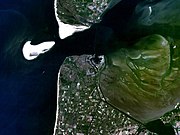Noorderhaaks
 Noorderhaaks seen from the mainland | |
 | |
| Geography | |
|---|---|
| Coordinates | 52°58′30″N 4°40′50″E / 52.97500°N 4.68056°E |
| Archipelago | (West) Frisian Islands |
| Adjacent to | North Sea |
| Administration | |
Netherlands | |
| Province | North Holland |
| Municipality | Texel |
| Demographics | |
| Population | Uninhabited |
Noorderhaaks (Dutch pronunciation: [ˌnoːrdərˈɦaːks]), also called Razende Bol (Raging sandbank in Dutch; in modern Dutch Bol means sphere, but in this context the old Dutch meaning of sandbank is meant[1]), is an uninhabited Dutch islet[2] in the North Sea, a few kilometres west of the Marsdiep which separates the island of Texel from the mainland of the Netherlands. The island covers an area of around 5 km2, although the exact area varies due to tide and the dynamic nature of the area.
Being relatively untouched by man, the island has become a valuable location due to its presence of several kinds of seabirds, and seals.
The island is slowly moving eastward towards the Marsdiep and the Molengat, at a pace of around 100 metres a year.[2] Noorderhaaks is probably the sixth sand bar to develop in the mouth of the Marsdiep, since it formed in the late twelfth century via a flood that occurred in 1170. The previous five have also moved towards Texel and got accreted to the island, with intervals of approximately 150 years each.[3]
The island is visited by day trippers, and is also being used as a training ground for the Royal Dutch Navy and Air Force.
-
Satellite photo, taken circa 1992
-
Stranded humpback whale (2012)
-
Time-lapse (1984-2017)
References
[edit]- ^ (in Dutch) "Woordenboek der Nederlandsche Taal", 1893.
- ^ a b (in Dutch) "Zandplaat De Razende Bol voortaan eiland", Nederlands Dagblad, 2003.
- ^ (in Dutch) Vos, A.D. (2012); Onderwaterarcheologie op de Rede van Texel Archived 2015-02-08 at the Wayback Machine, Nederlandse Archeologische Rapporten 041 (Rijksdienst voor het Cultureel Erfgoed, Amersfoort), p. 37-47.
External links
[edit]Media related to Noorderhaaks at Wikimedia Commons



